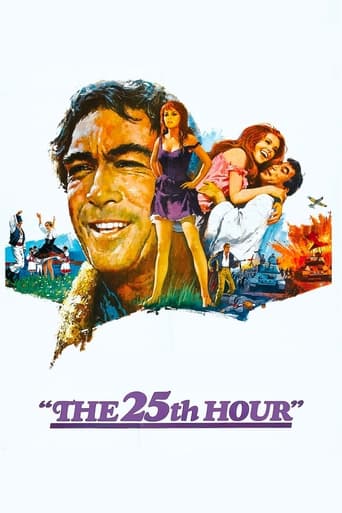tomsview
I first saw this film about the time it was released in the late 60's. Back then its unique quality didn't hit me straight away. It seemed to follow in the footsteps of David Lean's "Doctor Zhivago", which had been released the year before. Both were epic in scale and had a similar theme of a family separated by catastrophic historical events and the struggle to reunite. Quinn's portrayal of the naive Johann Moritz smacked of his similarly naive Barabbas from 1962. Also some of the irony in the story felt brushed on just a little too heavily.However, like many reviewers, I never forgot it, especially that troubling finale; it's a movie that stayed with me.Now having seen it again after 40 years, it no longer seems tied to the influences of the 1960's; it stands in its own space. I was swept along by its authentic look and tragic story. There have been a number of movies over the intervening decades that featured the Holocaust, but this one approached it from a different viewpoint. Johann's fate is linked to the persecution of the Jews in Romania in WW2. He and his family are separated by a tidal wave of events over which they have no control. Quinn's character is not an all-conquering hero, he is an ordinary, rather self-effacing man who displays disillusionment and fear, but is also an unlikely optimist with a strong will to survive and get back to his family. The film has impressive scenes, however, the human story is never overwhelmed by the spectacle. Virna Lisi as Suzanna Moritz is brilliant. Rather than being too beautiful to be believable, her allure brings unwanted attention and is the catalyst for much that happens.With the emotive sound of the cimbalom, the sense of tragedy is caught perfectly in Georges Delerue's score, which is used sparingly, but effectively. Rather than dwelling on the industrial scale evil that underpinned the Holocaust and the Nazi era, the exaggerated sense of irony that runs through the film highlights the corruption, abuse of power and sheer lunacy that went hand in glove with it. This is an unusual film, brave in many ways. I think it got lost in the shuffle back in the 60's but as many have noted, it has come through the decades without dating much at all.
Armand
after years, for me remains a revelation. about hidden Romania. about small history. about cruel form of solitude. more than beautiful, it is a touching film. a circle of ash. a testimony. in 1980 years, when I watch it first time, it was subject of extraordinary experience. the name of Virgil Gheorghiu was prohibit, the image of a Romania out of propaganda images was strange. but , after a time, more than story remains Anthony Quinn acting who gives new fresh colors to the message. because it is a picture of East. and body of a suffering without cure. open wound. and border of a delicate silhouette of hope. must see it ! because it is one of that films who gives a lot of surprises. a movie who transforms opinions and verdicts. and who draws , in special manner, basic elements of life.
Mehdi maral
I watched this film early 70's.It is the best film I have ever watched And I will never forget it as long as I live. I hate wars. I hate wars. I hate wars. I wonder why we humans still let wars happen. Do you? Do you know why all these wars go on and on and on? innocent people get killed, even today, for stupid and unreal rezone ? I watched this film early 70's.It is the best film I have ever watched And I will never forget it as long as I live. I hate wars. I hate wars. I hate wars. I wonder why we humans still let wars happen. Do you? Do you know why all these wars go on and on and on? innocent people get killed, even today, for stupid and unreal rezone ? I watched this film early 70's.It is the best film I have ever watched And I will never forget it as long as I live. I hate wars. I hate wars. I hate wars. I wonder why we humans still let wars happen. Do you? Do you know why all these wars go on and on and on? innocent people get killed, even today, for stupid and unreal rezone ?
Goose-42
Anthony Quinn is a master at capturing our heart and sympathy. He portrays a Romanian peasant with a below average IQ, harassed by his wife to do more. It's WWII and the Nazis have taken over his country. Soon he finds himself digging entrenchments hoping to benefit himself in his wife's eyes. The Nazis have different ideas. Through the next years we watch events unfold through his naive eyes, but all he wants to do is go home. His manipulations and ill luck just get him in further hot water. Finally, through no fault of his own, we see his picture on the cover of "Der Spiegel" as the perfect Aryan. The war ends and the allies put him on trial for war crimes. But all our peasant wants to do is return home to his wife.



